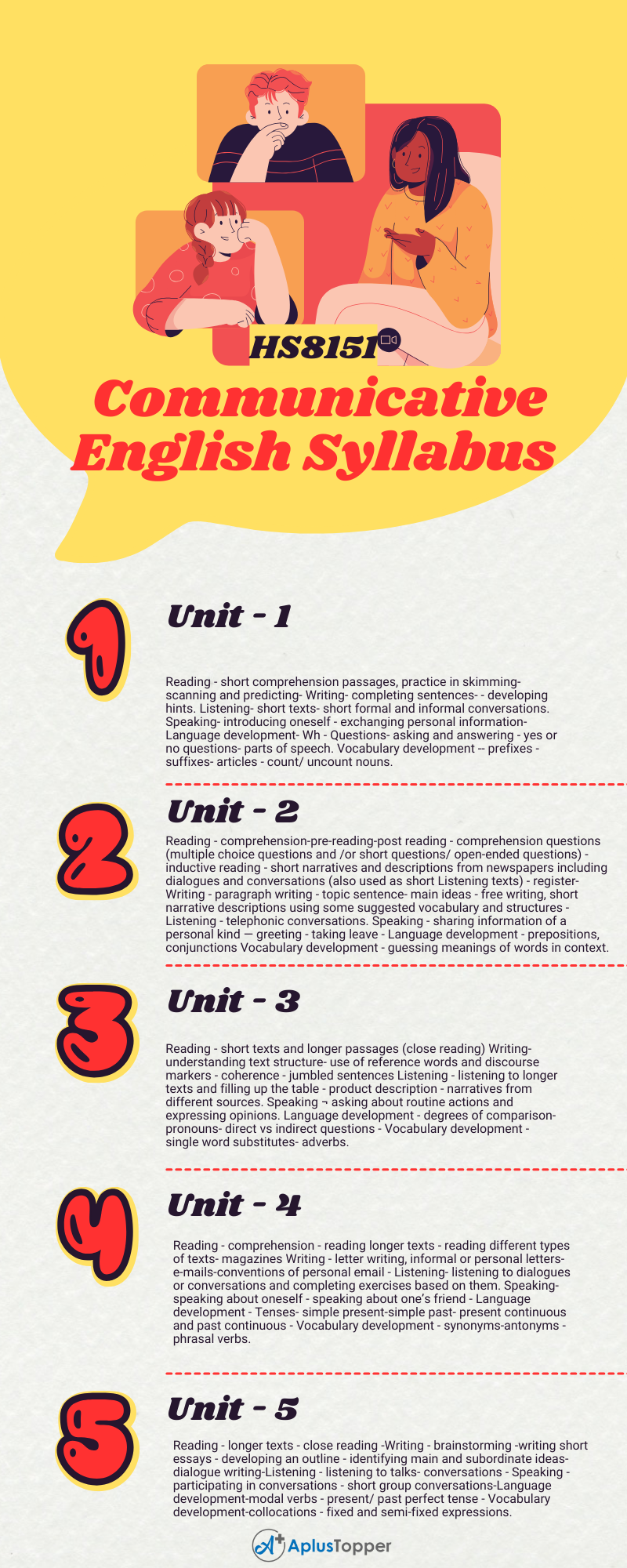Code – HS8151, this article about B.E/B.Tech./B.Arch Mechanical Engineering Semester I Communicative English syllabus. Students are requested to make notes or PDFs of the semester in Communicative English for effective preparation from here. It will help you to understand what are the topics in the syllabus.
And to make preparation strategies to score well in the examinations. Unit-wise detailed syllabus is given below in one place, in the following article HS8151 – Communicative English Syllabus. If the information helps you, kindly share it with your classmates.
If you want to know more about the syllabus of B.E Mechanical Engineering connected to an affiliated institution’s four-year undergraduate degree programme. We provide you with a detailed Year-wise, semester-wise, and Subject-wise syllabus in the following link B.E Mechanical Engineering Syllabus Anna University Regulation 2017.
Aim Of Concept:
- To develop the basic reading and writing skills of first-year engineering and technology students.
- To help learners develop their listening skills, which will, enable them to listen to lectures and comprehend them by asking questions; and seeking clarifications.
- To help learners develop their speaking skills and speak fluently in real contexts.
- To help learners develop the vocabulary of a general kind by developing their reading skills.
HS8151 – Communicative English Syllabus
Unit I: Sharing Information Related To Oneself/Family & Friends
Reading – short comprehension passages, practice in skimming-scanning and predicting- Writing- completing sentences- – developing hints. Listening- short texts- short formal and informal conversations. Speaking- introducing oneself – exchanging personal information- Language development- Wh – Questions- asking and answering – yes or no questions- parts of speech. Vocabulary development — prefixes – suffixes- articles – count/ uncount nouns.
Unit II: General Reading And Free Writing
Reading – comprehension-pre-reading-post reading – comprehension questions (multiple choice questions and /or short questions/ open-ended questions) – inductive reading – short narratives and descriptions from newspapers including dialogues and conversations (also used as short Listening texts) – register- Writing – paragraph writing – topic sentence- main ideas – free writing, short narrative descriptions using some suggested vocabulary and structures – Listening – telephonic conversations. Speaking – sharing information of a personal kind — greeting – taking leave – Language development – prepositions, conjunctions Vocabulary development – guessing meanings of words in context.

Unit III: Grammar And Language Development
Reading – short texts and longer passages (close reading) Writing- understanding text structure- use of reference words and discourse markers – coherence – jumbled sentences Listening – listening to longer texts and filling up the table – product description – narratives from different sources. Speaking ¬ asking about routine actions and expressing opinions. Language development – degrees of comparison- pronouns- direct vs indirect questions – Vocabulary development – single word substitutes- adverbs.
Unit IV: Reading And Language Development
Reading – comprehension – reading longer texts – reading different types of texts- magazines Writing – letter writing, informal or personal letters-e-mails-conventions of personal email – Listening- listening to dialogues or conversations and completing exercises based on them. Speaking- speaking about oneself – speaking about one’s friend – Language development – Tenses- simple present-simple past- present continuous and past continuous – Vocabulary development – synonyms-antonyms – phrasal verbs.
Unit V: Extended Writing
Reading – longer texts – close reading -Writing – brainstorming -writing short essays – developing an outline – identifying main and subordinate ideas- dialogue writing-Listening – listening to talks- conversations – Speaking – participating in conversations – short group conversations-Language development-modal verbs – present/ past perfect tense – Vocabulary development-collocations – fixed and semi-fixed expressions.
Text Books:
- Board of Editors. Using English A Course book for Undergraduate Engineers and Technologists. Orient BlackSwan Limited, Hyderabad: 2015
- Richards, C. Jack. Interchange Students’ Book-2 New Delhi: CUP, 2015.
References:
- Bailey, Stephen. Academic Writing: A practical guide for students. New York: Rutledge, 2011.
Means, L. Thomas and Elaine Langlois. English & Communication For Colleges. Cengage learning, USA: 2007 - Redston, Chris &Gillies Cunningham Face2Face (Pre-intermediate Student’s Book& Workbook) Cambridge University Press, New Delhi: 2005.
- Comfort, Jeremy, et al. Speaking Effectively: Developing Speaking Skills for Business English. Cambridge University Press, Cambridge: Reprint 2011.
If you want to check the syllabus of other branches provided by Anna University, Anna University syllabus Regulation 2017 will assist you in a clear path. Hope you find the required details.
Related Posts Of Semester – I:
- MA8151 – Engineering Mathematics -1 Syllabus.
- PH8151 – Engineering Physics Syllabus.
- CY8151 – Engineering Chemistry Syllabus.
- GE8151 – Problem-Solving and Python Programming Syllabus.
- GE8152 – Engineering Graphics Syllabus.
- GE8161 – Problem Solving and Python Programming Laboratory syllabus.
- BS8161 – Physics and Chemistry Laboratory Syllabus.
